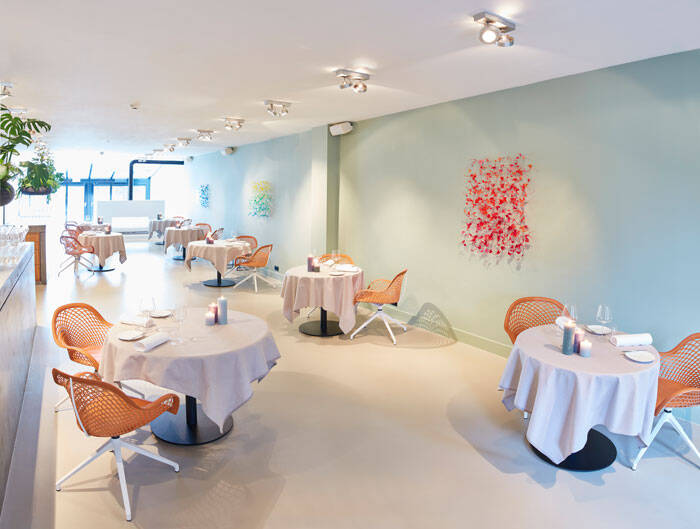
“
I think the biggest lesson we can learn during this pandemic is; where there’s a will there’s a way. It’s of no use to sit around, being depressed or to act defeated”
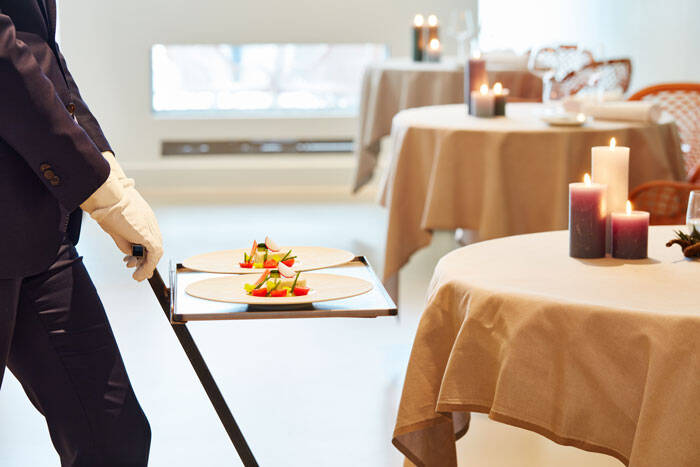
“
I have always dealt well with uncertainty. It’s my job as a chef to think creatively and to not shy away from hard work. Even in the worst of times you have to look for opportunities”
“
Nature moves fast. So I knew I had to move faster”
The good and the bad
“During the pandemic we became a lot more connected to all the locals; people who usually find us a little unapproachable. The shop is a more low-key than our restaurant, so some people were more comfortable stopping by. A lot of these locals that came to our shop made reservations to dine with us, now that the restaurant is reopened. You could definitely say that our audience has broadened. Because the deli was such a success, we will keep it open in the future.
I am worried about what will happen to the rest of the businesses on the Island. The first years after we started, you could say this island was a culinary desert. I prefer to work with local produce but I had to get a lot of stuff from the mainland. The past couple of years Texel has gained a lot of wonderful local food producers. Everyone keeps saying that this pandemic will make us eat more locally. But when the economy collapses, I fear small local producers will be the first to go.”
Welcome to the future
“After a while, people and the media started talking about ‘when we go back to normal.’ I think that’s stupid. If you do the math, you’ll realize back to normal is going to take a very long time. And even when there’s finally a vaccine, things will probably never be the same. For now I think it's wise to make adjustments and invest in your company. For example: we made changes in the timetables of our restaurant. We serve fewer people at the same time but do multiple shifts on more days. It's actually quite nice for our young staff. This way they can, for instance, do an early shift, go to the beach, have a night out and start the late shift the next day. Also we’ve created very special carts to serve our customers from a distance. They’re like Segways. On a special tray we perform the finishing touches to the plating, after which the dish is lifted on the table.”
Where there’s a will there’s a way
“I think the biggest lesson we can learn during this pandemic is; where there’s a will there’s a way. It’s of no use to sit around being depressed or to act defeated. You don’t have to start with a genius idea. Just get up and do something. We started with something small too, or at least that's what we thought it would be. Together with a local entrepreneur we decided to provide free Easter lunches for the elderly on our Island. As soon as we advertised this in the local newspaper we got hundreds of responses; a lot for an island that only has 1350 residents. A lot of non-elderly people were requesting if they could pay in order to get a lunch too. In the end we made over 1,000 meals, 300 of which we gave away to the elderly.
After that we thought, if there is so much local demand for a nice meal, why not set up a shop. I asked for some tips from friends in the industry and my brother, who is in advertising, made us a logo. Within two days we were ready to go. Running a deli seems a lot different than running a Michelin star restaurant. Of course that's true, but at the same time it’s still cooking. Fun and easy! Our hardest challenge was the packaging; how to make take-away food look nice?”
Acting fast
“We were one of the first restaurants in the Netherlands that closed their doors. Even before the government ordered it. My partner Nadine and I were cooking in the Maldives a few weeks before the virus entered Europe. They were already limiting air traffic and there were very few passengers on the plane. An ominous atmosphere. Although some were skeptical, it was no surprise to me COVID-19 hit the Netherlands. Nature moves fast. So I knew I had to move faster. As a chef you should know about contamination and how quickly bacteria can spread by, for example, touching your sleeve or using a dirty knife.
During the first week the virus hit the Netherlands I immediately called the bank and stopped a lot of our recurring payments, like rent and ongoing subscriptions. I wanted to keep as much money inside the company as possible. After that there was time to think: Okay what's next?”
Lisa Appels Xiao Er Kong
Nothing in life is certain. A motto Jef Schuur - owner and chef at Bij Schuur - believes in. During 25 years of running his restaurant and hotel on the idyllic Dutch island of Texel, a lot has changed. But nothing had as big an impact as the recent global pandemic.
Dutch Michelin star chef Jef Schuur started a deli during times of the Coronavirus pandemic



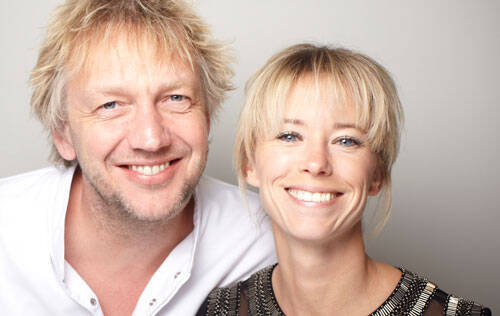
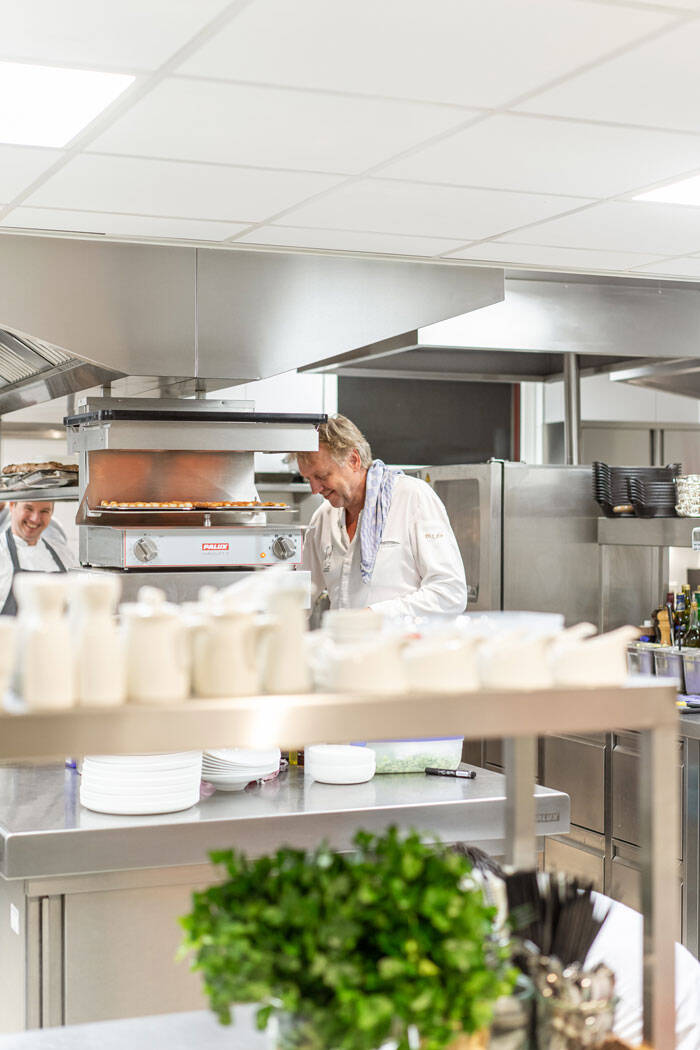

INTERVIEW
4 min
JUST GET UP AND DO SOMETHING
The good and the bad
“During the pandemic we became a lot more connected to all the locals; people who usually find us a little unapproachable. The shop is a more low-key than our restaurant, so some people were more comfortable stopping by. A lot of these locals that came to our shop made reservations to dine with us, now that the restaurant is reopened. You could definitely say that our audience has broadened. Because the deli was such a success, we will keep it open in the future.
I am worried about what will happen to the rest of the businesses on the Island. The first years after we started, you could say this island was a culinary desert. I prefer to work with local produce but I had to get a lot of stuff from the mainland. The past couple of years Texel has gained a lot of wonderful local food producers. Everyone keeps saying that this pandemic will make us eat more locally. But when the economy collapses, I fear small local producers will be the first to go.”
“
I think the biggest lesson we can learn during this pandemic is; where there’s a will there’s a way. It’s of no use to sit around, being depressed or to act defeated.”
Jef Schuur
“
I have always dealt well with uncertainty. It’s my job as a chef to think creatively and to not shy away from hard work. Even in the worst of times you have to look for opportunities.”
Welcome to the future
“After a while, people and the media started talking about ‘when we go back to normal.’ I think that’s stupid. If you do the math, you’ll realize back to normal is going to take a very long time. And even when there’s finally a vaccine, things will probably never be the same. For now I think it's wise to make adjustments and invest in your company. For example: we made changes in the timetables of our restaurant. We serve fewer people at the same time but do multiple shifts on more days. It's actually quite nice for our young staff. This way they can, for instance, do an early shift, go to the beach, have a night out and start the late shift the next day. Also we’ve created very special carts to serve our customers from a distance. They’re like Segways. On a special tray we perform the finishing touches to the plating, after which the dish is lifted on the table.”
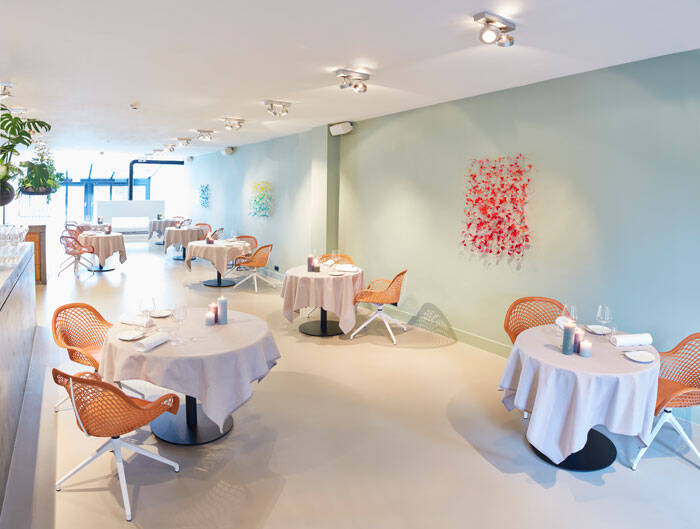
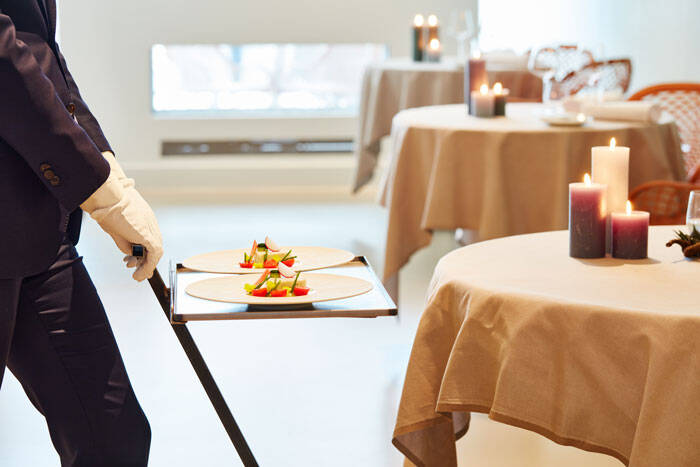
Where there’s a will there’s a way
“I think the biggest lesson we can learn during this pandemic is; where there’s a will there’s a way. It’s of no use to sit around being depressed or to act defeated. You don’t have to start with a genius idea. Just get up and do something. We started with something small too, or at least that's what we thought it would be. Together with a local entrepreneur we decided to provide free Easter lunches for the elderly on our Island. As soon as we advertised this in the local newspaper we got hundreds of responses; a lot for an island that only has 1350 residents. A lot of non-elderly people were requesting if they could pay in order to get a lunch too. In the end we made over 1.000 meals, 300 of which we gave away to the elderly.
After that we thought, if there is so much local demand for a nice meal, why not set up a shop. I asked for some tips from friends in the industry and my brother, who is in advertising, made us a logo. Within two days we were ready to go. Running a deli seems a lot different than running a Michelin star restaurant. Of course that's true, but at the same time it’s still cooking. Fun and easy! Our hardest challenge was the packaging; how to make take-away food look nice?”
“
Nature moves fast. So I knew I had to move faster.”
Acting fast
“We were one of the first restaurants in the Netherlands that closed their doors. Even before the government ordered it. My partner Nadine and I were cooking in the Maldives a few weeks before the virus entered Europe. They were already limiting air traffic and there were very few passengers on the plane. An ominous atmosphere. Although some were skeptical, it was no surprise to me COVID-19 hit the Netherlands. Nature moves fast. So I knew I had to move faster. As a chef you should know about contamination and how quickly bacteria can spread by, for example, touching your sleeve or using a dirty knife.
During the first week the virus hit the Netherlands I immediately called the bank and stopped a lot of our recurring payments, like rent and ongoing subscriptions. I wanted to keep as much money inside the company as possible. After that there was time to think: Okay what's next?”
Lisa Appels Xiao Er Kong
Nothing in life is certain. A motto Jef Schuur - owner and chef at Bij Schuur - believes in. During 25 years of running his restaurant and hotel on the idyllic Dutch island of Texel, a lot has changed. But nothing had as big an impact as the recent global pandemic.
Dutch Michelin star chef Jef Schuur started a deli during times of the Coronavirus pandemic
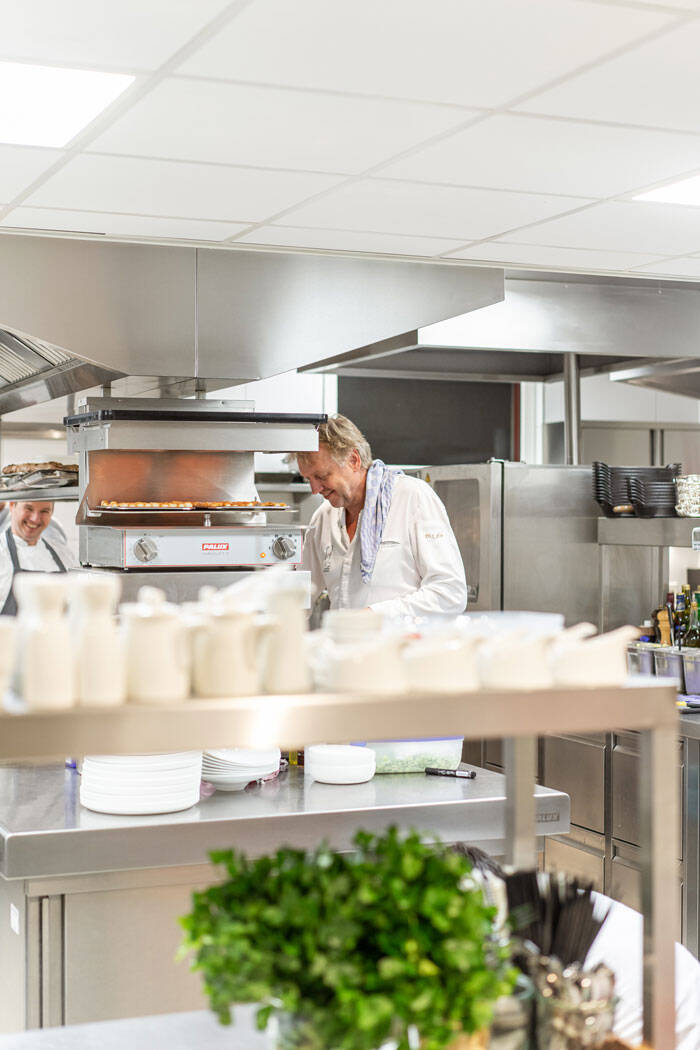


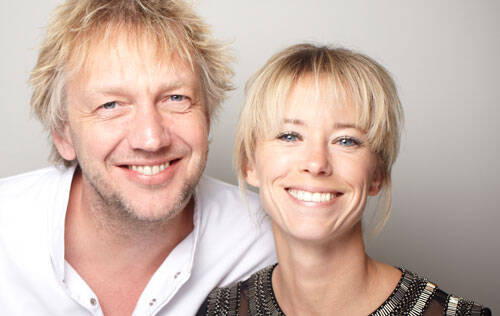
4 min








